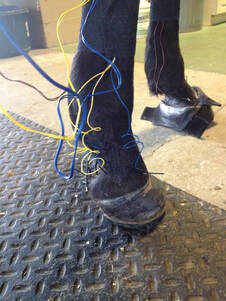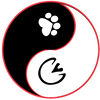 Jin - connective tissue tendon, ligaments, myofascia Jin is controlled by the Liver so tendon and ligament injury and disease are related to Liver disharmony. The Liver Blood and the Liver Yin keep the tendons and ligaments strong and flexible. Deficiency of Liver Blood and/or Liver Yin leads to weak tendons and ligaments that are prone to injury. Over work, stress, unbalanced shoeing can cause mechanical damage to the tendons resulting in pain aka Qi Stagnation. The Liver is the organ of the Wood Element. We have discussed Wood horses in previous blog posts. The Wood horse is athletic and strong. They want to win and because of that attitude, we sometime push Wood horses beyond their physical capabilities leading to tendon damage. Spring is the season associated with the Wood. Spring is the time we start training after a winter of rest and is the season of muddy deep footing. An unfit horse plus deep, slippery footing are factors that can lead to tendon injury. Diagnosis of tendon damage in Eastern and Western medicine is the same. There will be lameness, swelling, heat and tenderness in the area of tendon injury which is Qi and Blood Stagnation. Underlying conditions are Liver Yin and/or Liver Blood Deficiency as discussed above. Minor tendon injuries can sometimes be spotted on the DAPPE (Diagnostic Acupuncture Point Palpation Examination). We will see sensitive points at the shoulder and upper neck between C2 and C3. If these points are sensitive, along with sensitivity of the tendon locally to palpation, an ultrasound should be done to detect minor tendon damage. If present, treatment, rest and physical therapy should be started immediately. TCVM treatment principles include relieving the Qi and Blood Stagnation and then tonifying the Liver Blood and Yin. Our acupuncture treatment would be focused on local points near the injury along with points to support the Liver Blood and Yin. You may be wondering why your veterinarian is putting in so many needles in your horse’s hind leg when he has a front tendon injury. Many of our points for tendons are on the Gallbladder (Wood element) and Liver meridians which begin in the hind leg. Our main points for tonifying Blood and Yin are also close to the hock and stifle. Herbal therapy includes a topical formula, Relief Salve to increase blood flow to the area to reduce pain and edema along with an oral herbal formula, Tendon and Ligament formula, that treats pain and supports the Yin and Blood. The two main herbs in Relief Salve are Ru Xiang and Mo Yao aka Frankincense and Myrrh. These two tree resins have been used for centuries both topically to reduce pain, swelling and increase circulation to reduce bruising ie “move Blood”. They can also be used orally for diseases of stagnation like arthritis and cycling issues in mares. Ru Xiang Frankincense is aka as Boswellia and is many modern arthritis formulations to reduce pain. Relief salve also contains Zang Nao aka Camphor and Chuan Jiao aka Sichuan pepper. These are both aromatic and contain alkaloids that are quickly absorbed into the skin and cause numbness. Although Sichuan pepper is in the citrus family and is not actually a pepper, it’s alkaloid, hydroxy alpha sanshool, is very similar in structure to capsaicin found in chili peppers so should not be used for horses competing under FEI/USEF drug rules. That being said, if you are treating a tendon injury, your horse should not be competing, they should be resting and given time to heal. Bu Gan Qiang Jin San ( Tonify Liver Strengthen Tendons Powder aka Tendon and Ligament formula) is an oral herbal treatment that relieves pain and supports the Liver Yin and Liver Blood. Its main herb is Gou Qi Zi aka Goji berries which tonifies the Liver Yin and the Jing. Wu Jia Pi aka Siberian Ginseng or Eleutherococcus strengthens tendons and ligaments. It is considered an “adaptogen” which is a buzzword in natural health today meaning it helps the body resist stress. Current research indicates Wu Jia Pi may act on the hypothalamic-pituitary-adrenal axis to moderate the fight or flight instinct which can be very helpful to a Wood horse on stall rest and exercise restriction. Sang Zhi aka Mulberry twig is used as a transporter for the herbal formula to the limbs. Current research indicates compounds in Sang Zhi have Cox-2 inhibition activities similar to NSAIDs like previcox/equiox. Jing is the Qi you are born with. We only have a certain amount so it must be conserved. Horses that have developmental issues or are sick as young horses have a Jing deficiency. Degenerative Suspensory Ligament Desmitis (DSLD) is a Jing deficiency disease. These horses have a genetic defect in the cells that produce collagen to repair tendon damage. Overtime, the tendons and ligaments lose their elasticity leading to pain and slowly increasing pastern angle. We would treat these cases like a tendon injury to relieve the Stagnation and tonify the Liver Yin and Blood deficiency and then we would treat Jing deficiency along with therapeutic trimming & shoeing. The Jing can be supported with Food Therapy. Foods that tonify the Jing are goji berries 25 g (¼ cup) per day and Spirulina 20 g (2 TBs) per day . The Liver Yin and Blood can be supported with some of our horse’s favorite foods, apples and carrots. So it’s not all bad news when your horse has a tendon injury. He will get some time off, you can work on your clicker training and recovery involves lots of apples and carrots. Want to hear more about Tendon injury ? Listen in to our latest episode of Horses in the Morning : Driving. The TCVM segment starts at 29:20.
0 Comments
Your comment will be posted after it is approved.
Leave a Reply. |
�
Dr. WendyPractices Traditional Chinese Veterinary Medicine in Sarasota, Florida Categories
All
Archives
December 2023
|
|





 RSS Feed
RSS Feed

